Mattia Binotto: Ferrari team principal on Vettel v Leclerc and the battle to catch Mercedes
- Published
- comments
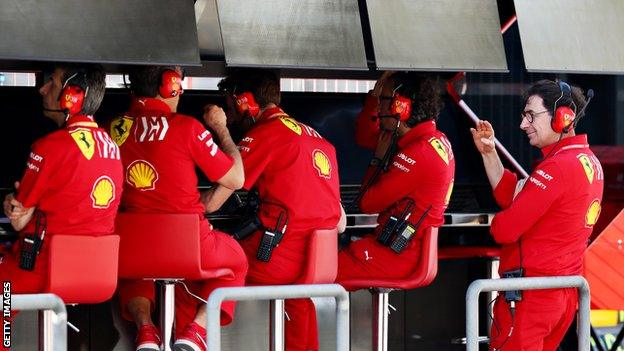
Former technical boss Mattia Binotto, right, has replaced Maurizio Arrivabene as team principal for the 2019 season
As he sits in his office at the Spanish Grand Prix, Ferrari team principal Mattia Binotto is the personification of calm. Which is something of an achievement in the circumstances.
Binotto has just watched his cars get trounced by Mercedes in qualifying around the Circuit de Barcelona-Catalunya, the Ferrari nearly a second off the pace despite design improvements the team hoped would allow them to compete for victory.
Twenty-four hours after our interview, as Mercedes drivers Lewis Hamilton and Valtteri Bottas disappeared into the distance in the race, Binotto and Ferrari drivers Sebastian Vettel and Charles Leclerc were embroiled in yet another team orders situation - as they have been, almost unbelievably, at every single race this year.
As a race, it was a microcosm of Ferrari's season. But Binotto - befitting his professorial, calm and considered character - is determined not to let Ferrari's obvious disappointment hinder attempts at a revival.
Point out to him that this season is a step backwards after 2017 and 2018, which Ferrari started with arguably the strongest car, and he says: "If we look at the overall season so far, no doubt if you look at the overall classifications or results, you would be right.
"There have been races where we have been very strong, such as Bahrain or Baku, and we could have had a different result. Overall, yes, we are not where we would like to be. We are under our expectations. But that doesn't mean that as an entire team we cannot progress and be competitive in the future."
In an extensive and exclusive interview with BBC Sport, Binotto discusses:
Ferrari's driver situation
Team orders
His management style
Why Ferrari are uncompetitive
Whether the season is effectively already a write-off
The quest for 'clarity and serenity'
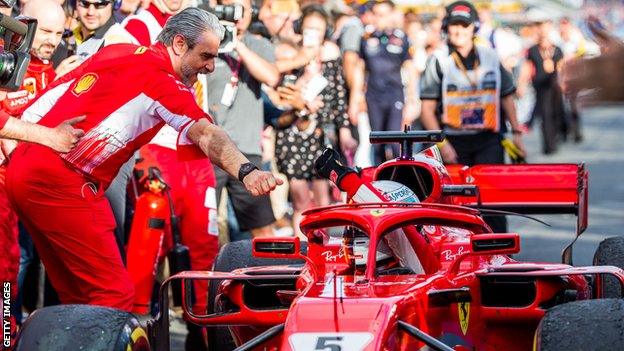
Arrivabene, 61, had been boss of the Ferrari team since December 2014
To understand the mentality with which Ferrari entered this year, one has to look back at 2018, which started so well, but ended in disappointment.
Vettel could - arguably should - have won the title, regardless of a slight dip in form by Ferrari at the end of the year, but for five significant driving errors from summer onwards.
The team's operational management was also called into question, and former team boss Maurizio Arrivabene - perceived to be bullish and adversarial - appeared to fail to keep Ferrari on an even keel.
Arrivabene's contract was not renewed and Binotto was promoted from technical director to replace him. The team continues to operate with what Binotto calls the "horizontal organisation" set up in 2016 by former Ferrari president Sergio Marchionne, who died last July, but the environment and approach from the top are very different.
Binotto says Ferrari are a "young team still building experience and in a very steep learning phase", which in comparison with Mercedes and Red Bull, where the senior personnel have been together considerably longer, is true.
His methodology is to "make people feel accountable for what they are doing, support them and put them in the right conditions to deliver". This, he says, "is a matter of clarity, serenity, stability and trust".
He says: "To win, or to create a great group with winning mentality, you need first stability, but serenity as well. And it is only by creating an internal and mutual trust that you can achieve it.
"It is really a matter of trying to build the right spirit in the team, with the right objectives, which are to be ambitious. We are not here just trying to participate."
This is the backdrop to the decision to prioritise Vettel over his talented but inexperienced new team-mate, in one of what Binotto has called "50-50 decisions" at the start of the season.
'To perform, a driver needs to feel comfortable'
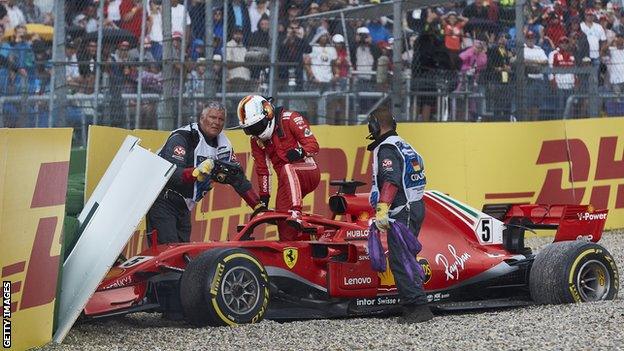
Sebastian Vettel dominated the 2018 German Grand Prix race but crashed with 15 laps to go
For many, Vettel's errors in 2018 came in the context of the pressure created by the lack of exactly the kind of internal environment Binotto describes.
Binotto skirts the question of whether there was a direct link between the two by saying he "doesn't want to judge it", but adds: "It is my role to make sure it happens in the right way today. Certainly a driver, to perform to the maximum, needs to feel comfortable - within the team, with the car."
His decision to favour Vettel, he says, was "based on the fact that I am pretty convinced that the team comes first".
"So our first objective is to maximise the team points," he says. "And to do that, knowing we have two fantastic drivers but with two different levels of experience, I think what we did was all right.
"If there are any decisions that need to be taken in some circumstances, they should be in the favour of the most experienced driver. That's it."
He admits he "may always make mistakes" in operating this policy, but says he is "pretty convinced that by the end of the season" the team will benefit.
It's a decision based on the theory that Vettel, as a four-time champion with 52 wins and 13 years' experience, was the more likely to put together a season consistent enough to challenge Mercedes.
Did Binotto not have any doubts, given the number of errors Vettel made last year?
"No."
Why not?
"Because Seb is a fantastic driver. He has been four-times world champion. I believe that if he is comfortable and he has serenity in his mind, he can deliver well."
Does Vettel's contract dictate that he is number one driver?
"No," Binotto says. "It is not a matter of being number one driver. It is team interest first."
Team orders
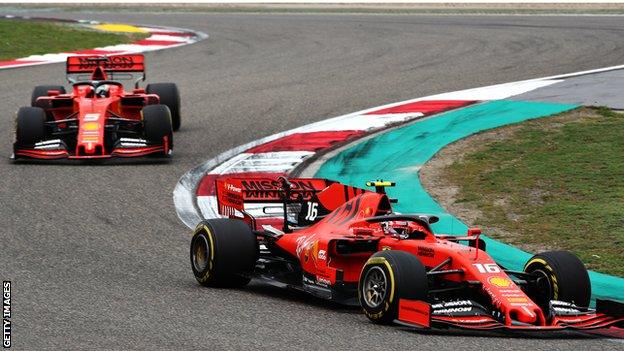
Charles Leclerc was ordered to make way for Vettel in China
Ferrari's policy is the reason Leclerc was told to hold station behind Vettel when he caught the German on fresher tyres at the end of the Australian Grand Prix.
The same request was made as Leclerc caught him in the early stages in Bahrain. Leclerc was ordered out of Vettel's way in China. And in Baku. And again in Spain - where Ferrari also did the reverse, favouring Leclerc, in the first part of the race after Vettel had damaged a tyre at the first corner.
The decisions all made sense, in isolation and within the context of Ferrari's approach, with perhaps the exception of Bahrain. There, Leclerc had been demonstrably superior to Vettel all weekend, and had dropped back only because of a bad start from pole.
He caught Vettel at half-a-second a lap, and asked over the radio what he should do. They asked him to hold station for two laps. Why, given that Binotto has also said that if one driver is clearly faster than the other, he will be allowed to race and pass?
"Simply because in those laps when Charles was catching up, Sebastian was managing his tyres and his fuel and he was not somehow pushing to the limit," Binotto says. "So we said: 'OK, give him a couple of laps, try to settle his pace and let's see.'
"But Charles was fast enough without waiting to overtake him, and finally we are happy with what happened because, in the end, we would not have restrained Charles from overtaking if he had been faster in the following laps."
Leclerc took matters into his own hands and passed Vettel a few corners later anyway. How did Ferrari handle the fact he had disobeyed a direct team order, even if it was the correct decision?
"We discussed that all together," Binotto says. "Together with Charles, together with Seb. He disobeyed, yes, but he overtook with no risk.
"But more than that, he was quite disciplined because he first came on the radio when closing the gap on Seb and asked: 'What should I do?' I was happy about that.
"So he recognised the team interest, but also that at that specific moment he was faster on the straight and he had the opportunity. So it is fine. We understand these situations.
"In this circumstance, he was fast enough to overtake and maybe it was more the mistake on our side to [ask him to] wait to overtake for a couple of laps."
The politics of the driver battle
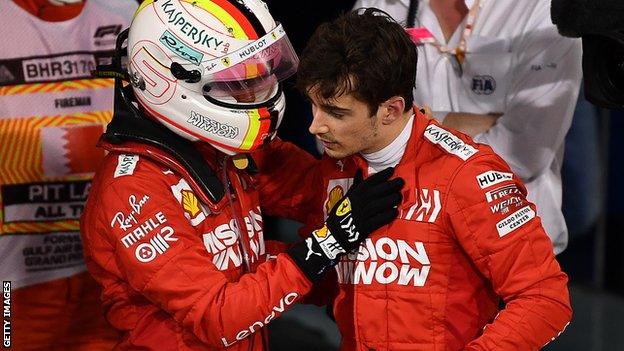
Ferrari have been using team orders to favour Vettel over Leclerc
Team policies, though, do not reduce the inherent pressure of the situation within Ferrari. Leclerc is clearly good enough to challenge Vettel, a situation which threatens the German's status not only in the team, but also in Formula 1.
If Leclerc prevails, Vettel's career is potentially in danger. If he wanted to leave Ferrari to remove himself from the threat of being the secondary driver - as his friend, the former F1 boss Bernie Ecclestone, has said he would - his options are limited.
On the other side, Leclerc is quick, ambitious and desperate to prove himself. In the five races so far this season, he has been demonstrably quicker than Vettel in two - Bahrain and Baku. In one of them, he lost victory to an engine problem. In the other, he threw away the potential himself with a crash in qualifying.
In the other three races, there has been nothing to choose between the two drivers, and they have been separated only by a series of small errors by Leclerc at crucial moments in qualifying.
Does Binotto think the pressure this situation creates is provoking these errors from Leclerc?
"For a driver in a Ferrari, anyway it is a lot of pressure," he says, "especially if you are a rookie.
"The only thing we always tell Charles, and I think that is the way to approach it, is he has to be focused on himself first, because I think there is still much for him to experience and learn and I am pretty sure that this season in that respect will be very useful.
"So I would separate the two things. So my answer would be no."
Assessing Leclerc, Binotto says: "He is very fast, even surprisingly very fast in the start of the season. But more than that, he is a very mature driver. He is a hard worker, he is really working very well with the engineers.
"He has got a lot of, let me say, desire to perform well and that is something on which we are very happy."
What is he going to do if it transpires that Leclerc is quicker than Vettel?
"If there will be a time where Charles is consistently quicker, or is quicker, there will be no discussions, because he will simply be ahead," Binotto says.
And how does he think Vettel would respond to that?
"Sebastian is an experienced driver," Binotto says. "If that would be the case, I think he would put maximum effort himself to improve and understand where are his limitations.
"So in the end it's a good benchmark for both of them. I would prefer to have such a problem than not."
The car problem
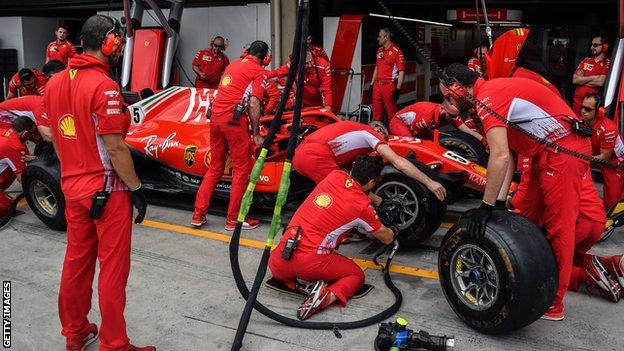
Ferrari have so far failed to make the most of their superior power advantage
Ferrari's driver policy was formulated in the expectation of a season competing for the title with Mercedes, as had been the case in 2017 and 2018, and a desire to maximise points in the fight with Hamilton, who has proved to be a formidable rival.
But the car's lack of performance is rapidly threatening to end any pretensions of being championship contenders. Mercedes have scored one-twos in all five races so far.
The car is quicker than the Mercedes on the straights but slower - by a greater margin - in the corners, where it is primarily troubled by understeer on entry - a lack of front-end grip.
As to why, and how to solve it, Binotto says: "We don't have a clear picture at the moment."
He says that "no doubt in slow corners, we are weak" and he believes "it could be a combination of various factors and not a single one".
So why was the car competitive at Bahrain and Baku, which are predominantly made up of slow corners?
"We do not have an answer yet."
Ferrari's design philosophy - different from Mercedes', especially in the way the front wing sets up the airflow over the rest of the car - has also been raised as a possible cause.
"Again, I think there is not a straightforward answer to that one," Binotto says. "It is part of the things we need to analyse.
"Barcelona will make us only stronger in the future and to be strong means to go through that type of exercise on which we do not have an answer yet."
Does he realistically believe Ferrari can catch Mercedes?
"I think sooner or later we will do it, yes."
Can they do it in time to save this season?
"Er, difficult to answer. Certainly it is a lot of points at the moment."
If not in the championship, in terms of performance?
"I think, yes, on the performance side there is still possibility."
So you believe the potential is still in the car to win?
"Yes."
